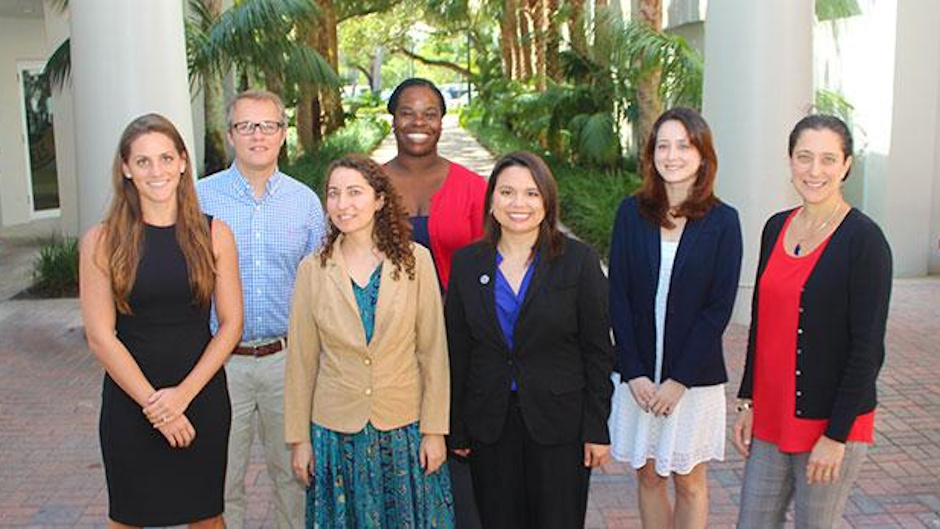Written by: ANABEL BLANCO, FERNANDO RODRIGUES DA MOTTA BERTONCELLO, & MEREDITH SHEA
On April 26, 2018, David Brame, then police chief of Tacoma, Washington, shot his wife in the head and then fatally shot himself in a mall parking lot. Crystal Brame died a week later. The couple had been going through a divorce, and the day before the shootings, allegations that Brame had abused his wife were made public. In one of the divorce papers, Crystal Brame had claimed that her husband pointed his police gun at her and tried to choke her, telling her that he could snap her neck if he wanted to. Investigations following the incident revealed that top Tacoma officials had promoted the police chief despite allegations of domestic abuse.
Although it is one of the most notorious and well-documented examples of gender-based violence committed by a law enforcement officer, the Brame tragedy is far from an isolated incident. This October, Miami Law's Human Rights Clinic, along with Casa de Esperanza, End Violence Against Women International, Futures Without Violence, and Women in Federal Law Enforcement, submitted an Intervention to the European Court of Human Rights in Toradze v. Georgia. Toradze v. Georgia is a case brought by the Georgian Democracy Initiative (Tbilisi) and the European Human Rights Advocacy Centre (based at Middlesex University, London).
This is a case where a police officer leveraged his official position to perpetrate domestic violence. The Intervention, more commonly known in the U.S. as an amicus brief—or filing by a non-party to the case to assist the court with expertise—focused precisely on the issue of accountability for officer-perpetrated GBV.
The Human Rights Clinic works for the promotion of social and economic justice globally. In the U.S. Specifically, the Clinic’s COURAGE (Community Oriented and United Responses to Address Gender Violence and Equality) in Policing Project works to enhance law enforcement response to domestic violence and sexual assault, in partnership with community-based organizations, police departments, and national leaders.
An essential part of adequate law enforcement response is accountability for GBV committed by law enforcement officers. This semester, two student teams in the Human Rights Clinic focused on the COURAGE Project: one team has focused efforts on the law enforcement response to GBV in Miami-Dade, while another team has analyzed relevant international and regional human rights law, as well as good practices and challenges in various countries.
GBV is defined under international and European law as violence that is directed against a woman because she is a woman or that affects women disproportionately. It is a form of discrimination against women, which encompasses physical, sexual, psychological or economic harm or suffering to women.
Officer-perpetrated GBV has unique characteristics that make it a particularly critical issue to address. This type of abuse is rooted in the tremendous power bestowed on officers by virtue of their positions: as illustrated by the Brame case, police officers can be particularly dangerous because of their access to guns and special training in fighting and controlling those who challenge them. Officers further have insider knowledge and the ability to manipulate the justice system.
“Officer-perpetrated GBV is so prevalent and yet so rarely addressed or even recognized as an issue. States must take immediate action to prevent impunity and ensure accountability for officers who use their authority, knowledge, and privilege to facilitate abuse in their relationships,” said Tamar Ezer, the Associate Director of the Clinic.
In their Intervention, the COURAGE teams and the partners urged the European Court to consider, in the context provided by the case of Toradze v. Georgia, important principles that have been developed by international, regional, and national authorities on policing and human rights, and to apply a heightened responsibility standard in cases of officer-perpetrated GBV. In making this novel argument, the Intervention emphasized the need for a heightened standard to prevent State impunity and put in place systemic measures, including effective investigation procedures, legislation, and public policy, to address this issue proactively.
The Clinic students found the entire process, from researching the law to drafting the Intervention itself, both deeply educational and, perhaps more importantly, emotionally engaging. One of the students, Miami Scholar Damian Gonzalez, expressed the prevailing feeling when he explained “knowing that we played a small part in the struggle for justice for survivors of domestic violence and sexual assault worldwide was beyond transformative.”
Officer-perpetrated GBV is a ubiquitous problem that will require concerted efforts to overcome. The Miami Law Human Rights Clinic students, and the COURAGE Teams, in particular, will continue to work with advocates locally, nationally, and globally to strengthen law enforcement responses to GBV.
More on the Human Rights Clinic
More on COURAGE (Community Oriented and United Responses to Address Gender Violence and Equality)

